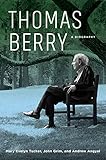Thomas Berry : A Biography / Mary Evelyn Tucker, Andrew Angyal, John Grim.
Material type: TextPublisher: New York, NY : Columbia University Press, [2019]Copyright date: ©2019Description: 1 online resource : 53 b&w photographsContent type:
TextPublisher: New York, NY : Columbia University Press, [2019]Copyright date: ©2019Description: 1 online resource : 53 b&w photographsContent type: - 9780231176989
- 9780231548793
- 282.092 23
- BX4705.B4455 T83 2019
- online - DeGruyter
- Issued also in print.
| Item type | Current library | Call number | URL | Status | Notes | Barcode | |
|---|---|---|---|---|---|---|---|
 eBook
eBook
|
Biblioteca "Angelicum" Pont. Univ. S.Tommaso d'Aquino Nuvola online | online - DeGruyter (Browse shelf(Opens below)) | Online access | Not for loan (Accesso limitato) | Accesso per gli utenti autorizzati / Access for authorized users | (dgr)9780231548793 |
Frontmatter -- Contents -- Acknowledgments -- Introduction: Thomas Berry and the Arc of History -- 1. An Independent Youth -- 2. The Call to Contemplation -- 3. Studying History and Living History -- 4. The Struggle to Teach -- 5. From Human History to Earth History -- 6. From New Story to Universe Story -- 7. Evoking the Great Work -- 8. Coming Home -- 9. Narratives of Time -- 10. Teilhard and the Zest for Life -- 11. Confucian Integration of Cosmos, Earth, and Humans -- 12. Indigenous Traditions of the Giving Earth -- Epilogue -- Appendix: Thomas Berry Timeline, 1914-2009 -- Notes -- Bibliography -- Index
restricted access online access with authorization star
http://purl.org/coar/access_right/c_16ec
Thomas Berry (1914-2009) was one of the twentieth century's most prescient and profound thinkers. As a cultural historian, he sought a broader perspective on humanity's relationship to the earth in order to respond to the ecological and social challenges of our times. This first biography of Berry illuminates his remarkable vision and its continuing relevance for achieving transformative social change and environmental renewal.Berry began his studies in Western history and religions and then expanded to include Asian and indigenous religions, which he taught at Fordham University, Barnard College, and Columbia University. Drawing on his explorations of history, he came to see the evolutionary process as a story that could help restore the continuity of humans with the natural world. Berry urged humans to recognize their place on a planet with complex ecosystems in a vast, evolving universe. He sought to replace the modern alienation from nature with a sense of intimacy and responsibility. Berry called for new forms of ecological education, law, and spirituality, as well as the creation of resilient agricultural systems, bioregions, and ecocities. At a time of growing environmental crisis, this biography shows the ongoing significance of Berry's conception of human interdependence with the earth as part of the unfolding journey of the universe.
Issued also in print.
Mode of access: Internet via World Wide Web.
In English.
Description based on online resource; title from PDF title page (publisher's Web site, viewed 02. Mrz 2022)


